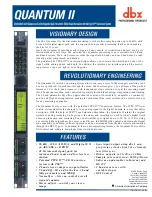
www.scheppach.com /
+(49)-08223-4002-99 /
+(49)-08223-4002-58
GB | 23
Setting the counter blade
The counter blade and the blade cylinder have
been ideally adjusted by the manufacturer.
Re-adjusting the counter blade is only required if
it becomes worn. For maximum performance, it
is necessary that the distance between the coun-
ter blade and blade cylinder is about 0.50 mm.
•
Turn the shredder on.
•
Turn the adjustment wheel (9) clockwise until you
can hear slight grinding sounds.
•
When turning the adjustment wheel (9) clockwise by
half a turn, the blade cylinder is positioned closer to
the counter blade by 0.50 mm.
WARNING: If the shredder blade touches the
counter blade, it will be trimmed and small pieces
of swarf may fall out of the ejection opening. This
is not an error, but it has to be re-adjusted to the
required degree because otherwise the counter
blade will wear too early.
Overload protection
In the event of overload, e.g. due to branches that are
too thick, the equipment automatically switches off.
After a short cooling period (approximately 5 minutes),
press the reset switch (12).
10. Electrical connection
The electrical motor installed is connected and
ready for operation. The connection complies
with the applicable VDE and DIN provisions. The
customer‘s mains connection as well as the ex-
tension cable used must also comply with these
regulations.
Damaged electrical connection cable
The insulation on electrical connection cables is of-
ten damaged.
This may have the following causes
• Passage points, where connection cables are
passed through windows or doors.
• Kinks where the connection cable has been im-
properly fastened or routed.
• Places where the connection cables have been cut
due to being driven over.
• Insulation damage due to being ripped out of the
wall outlet.
• Cracks due to the insulation ageing.
Such damaged electrical connection cables must not
be used and are life-threatening due to the insulation
damage.
2. Assembling the stand to the machine body
(Fig. G/H)
• Fit the supporting feets (3) onto the threaded bolts
(18) of the machine body (Fig. G)
• Fit the supplied lock nuts (16) by hand (Fig. G) and
tighten them with the wrench (a) (Fig. H).
3. Attaching the Collecting bag (Fig. I/K)
To collect the chopped material, attach the supplied
collecting bag (6) to the hooks provided (Fig. H).
9. Operation
Control panel (Fig. A)
•
On switch (7):
Pressing this button starts the shred-
der.
•
Off switch (8):
Pressing this button stops the shred-
der.
•
Switch for roll rotation direction (11):
-
Button „▲“ - anti-clockwise: When this button is
pressed, the blade cylinder rotates anti-clock-
wise. This is necessary when jammed shredding
material needs to be freed. This function is only
available when the shredder is in operation.
-
Button „▼“ - clockwise: This button switches the
direction of the blade cylinder from anti-clock-
wise back to clockwise.
• Reset-switch (12):
Overload protection
Working with the shredder
Alternating with branches, shred withered gar-
den waste and branches that have been stored
several days to prevent the shredder from be-
coming blocked.
• Connect the shredder to the power supply.
• Turn the shredder on by using the on switch (7).
• Fill shredding material into the feed hopper and it
will be drawn in.
• Caution
:
If the material becomes jammed, first press
the red off switch (8) to stop the device. Push the switch
for roll rotation direction (11) downwards to the “ = “
sign. Start the device by pressing the green on switch
(7). Stop the device by pressing the red off switch (8).
Remove the jammed material. Push the switch (11) to
the “ - “ sign. The device is ready for operation.
• Make sure the shredder has completely shred-
ded the input material before adding new.
• Do not use your hands to push in more shredding
material. Use the special pushing device (c) or oth-
er shredding material.
•
When you have finished working with the shredder,
turn it off and disconnect it from the mains.















































